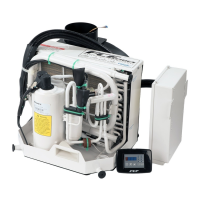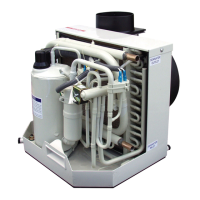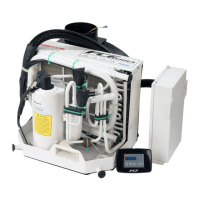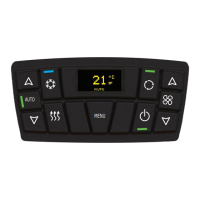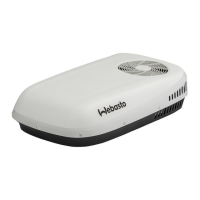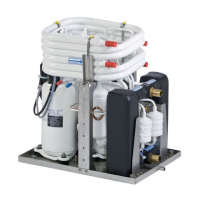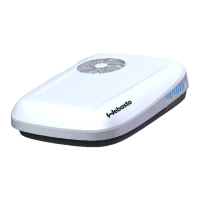Do you have a question about the Webasto FCF 5,000 and is the answer not in the manual?
Explains the four main components and refrigerant circulation in the air conditioning system.
Guides the user on checking received items against the packing list and inspecting for shipping damage.
Details crucial safety precautions for installation, including location and electrical hazards.
Provides guidance on selecting the best location for the air conditioner unit, considering airflow and accessibility.
Explains how to install condensate drains, including hose routing and connection requirements.
Describes the blower's rotation for multi-directional air discharge and its removal for servicing.
Details the use of mounting brackets to secure the unit to a flat, horizontal surface.
Guides on installing supply and return air grilles for optimal airflow distribution and avoiding short cycling.
Emphasizes the importance of quality ducting installation for system performance and lists proper connection guidelines.
Outlines guidelines for installing the seawater system, including pump mounting, strainer, and hose routing.
Details electrical connections, grounding, bonding requirements, and safety precautions for wiring.
Important notice regarding proper phase sequencing for three-phase power sources to ensure correct operation.
Provides instructions on selecting the location and mounting the wired display panel for the remote controller.
Guides on mounting the control box in a suitable location, ensuring access for wiring and maintenance.
A checklist covering seawater cooling, mounting, electrical, and ducting aspects before final installation.
A brief checklist for initial system startup and verification after installation is complete.
Explains the functions of the wired display panel buttons and its memory retention capabilities.
Instructions on how to turn the unit on and off using the ON/OFF button on the controller.
Details how to adjust the fan speed through the controller, including the sequence of settings.
Explains how to adjust the desired temperature and lists the setting ranges for different modes.
Describes how to change the operation mode (COOL, HEAT, AUTO, etc.) and the function of each mode.
Explains how to switch the temperature display between Fahrenheit and Centigrade modes.
Lists common error codes displayed on the controller and their corresponding descriptions.
Instructions on how to lock and unlock the controller keys, and the effect of the lock mode.
Details how to set a starting time interval between multiple units to prevent electrical overload.
Explains the auto-off feature where the display turns off after a period of inactivity on the manual controller.
Lists the available accessories for the unit along with their quantities.
Details the functions of buttons on the remote control when the cover is closed, including temp, mode, and fan controls.
Explains the functions of buttons on the remote control when the cover is open, including the liquid crystal display.
Describes the operation of the COOL and HEAT modes, including conditions for compressor activation and temperature ranges.
Explains the operation of the dehumidify mode, including fan speed and temperature settings.
Details the procedure for operating the unit in FAN mode, noting that temperature cannot be set.
Provides step-by-step instructions for replacing the batteries in the wireless remote control.
Lists common reasons and corrections for the unit failing to start or power on.
Provides troubleshooting steps for issues related to insufficient cooling or heating performance.
Addresses specific issues when the unit fails to provide heat, such as a stuck reversing valve.
Explains causes for low airflow, such as blocked filters or ducting, and their solutions.
Details troubleshooting steps for when the evaporator coil freezes over, including defrosting methods.
Covers reasons why the system might run constantly and how to correct them, like incorrect set points.
Guides on troubleshooting a non-functional display panel, focusing on connections and damage.
Instructs on periodic energizing of the reversing valve to keep internal parts moving freely in reverse cycle units.
Emphasizes regular cleaning of the strainer basket for adequate seawater flow and checking intake speed scoop.
Recommends oiling blowers every six months, noting exceptions for certain blower types.
Provides detailed steps for cleaning the condenser coil using a chemical solution and flushing with fresh water.
Advises on checking and cleaning the return air filter monthly by rinsing with water and air drying.
Explains various methods for winterizing the unit, focusing on using anti-freeze solutions and protecting the pump.
| Cooling Capacity | 5, 000 BTU/h |
|---|---|
| Voltage | 115 V AC |
| Weight | 38 lbs |
| Dimensions | 16" W x 12" H x 14" D |
| Phase | 1 |
| Frequency | 60 Hz |
| Power Supply | AC |
